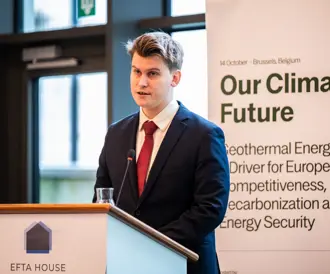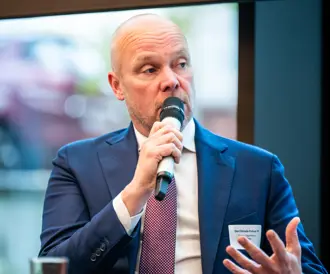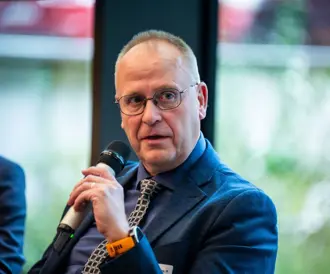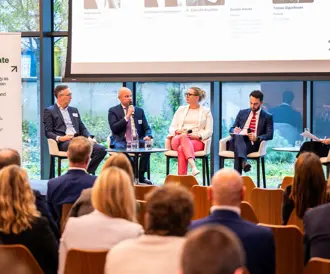HS Orka has been a key supporter of OCF from the beginning. The event is organized annually by Business Iceland and Green by Iceland, alternating between Europe and North America, in collaboration with Icelandic embassies in each host country.
This year’s theme was: “Geothermal Energy as a Driver for European Competitiveness, Decarbonisation and Energy Security.”
Given the location—at the heart of the European Union—HS Orka placed strong emphasis on active participation in both the planning and execution of the event. Attending on behalf of the company were CEO Tómas Már Sigurðsson, Head of Sustainability Finnur Sveinsson, and EVP of Strategy and the Resource Park Jón Ásgeirsson.
Clear Goals and Significant Interests
Jón Ásgeirsson, who has represented HS Orka at OCF for several years, said the event was a great success this year:
“The purpose of the meeting was to highlight that Iceland should be a guiding light for the continent—especially the EU—in geothermal utilization, both low- and high-temperature, now that Europe is seriously embarking on its geothermal journey. This is important because the nature of geothermal energy is not well understood abroad—it’s sometimes viewed similarly to better-known underground resource industries like oil or mining. That can lead to incentive systems and regulations, created with good intentions, being poorly suited or even conflicting with the nature of geothermal energy.”
Important to reach influential stakeholders
Jón believes such forums are of great importance to domestic energy producers like HS Orka: “It’s clearly vital that regulations adopted by Iceland as part of the European Economic Area are efficient and suitable for geothermal. Also, Iceland is highly dependent on foreign trade, so it’s crucial that products utilizing domestic energy sources are undeniably produced sustainably and responsibly, and fetch the highest possible prices in international markets.
We’re already facing regulatory issues that could put geothermal in a grey area, so it’s important to reach influential stakeholders, bring facts to the table and propose solutions.”
Unity and a Strong Narrative
Jón emphasized the importance of the Icelandic geothermal sector presenting a united front in Brussels: “We worked hard within Samorka (the Icelandic energy association) to align the sector’s messaging, and it was especially gratifying to see all Icelandic representatives speak with one voice at the event. That’s crucial in advocacy like this and is permissible within the bounds of competition law.
It’s important to respect those boundaries, as some of the companies involved are and should be in strong competition with each other in the market.”
A key factor in the event’s success was Samorka’s hiring of Sveinn Helgason in Brussels, which greatly aided preparations.
“We also had a compelling story to tell. We described Iceland’s geothermal district heating rollout and what worked well in terms of financing and legislation. We emphasized that geothermal can deliver diverse benefits if opportunities for multi-use are well utilized.
Additionally, we pointed out that geothermal is a secure energy source that is inherently decentralized and can therefore operate independently of central systems. That’s increasingly important given global developments and emerging external threats,” Jón added.
Geothermal as a Potential Cornerstone
International lobbying experts considered the event highly successful. Their assessment was that it effectively reached key stakeholders—both within the EU’s administrative system and among other interested parties.
According to Business Iceland’s website, over 150 experts, executives, and policymakers from various countries attended the event.
The article quotes Dan Jørgensen, EU Commissioner for Energy and Housing, who stated that geothermal is an underutilized energy source in Europe that could become a cornerstone of clean energy.
Iceland’s Minister for Environment, Energy, and Climate, Jóhann Páll Jóhannsson, also addressed the meeting, saying:
“Whether nations face threats from natural disasters or conflict, it is always essential to ensure energy security through stable, local, and renewable energy sources like geothermal.”



